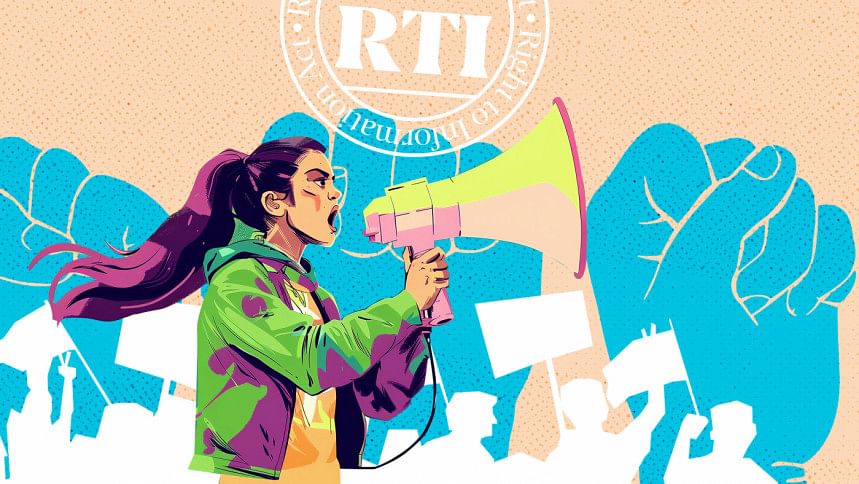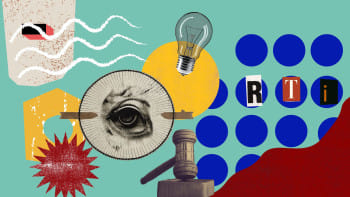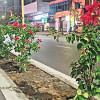It’s time our youth used their right to information

More than five months after the interim government took office in Bangladesh, our youth who spearheaded this change appear to have not yet discovered the country's Right to Information (RTI) Act, the only instrument available to citizens to probe the work of government offices. Yet, this is a readily available tool for them to create the changes in governance that they wish to see.
NGOs and activists still promoting the RTI law, however, tell us there have been recent indications of interest among youths in exercising the law. For this budding interest to turn into action, more of them must come forward, and the vacant information commissioner posts must be filled. Here are some examples to help our youth understand the importance of the RTI law.
The first example, dating back to 2010, relates to one of the earliest RTI requests in the country. It was submitted by the Bangladesh Environmental Law Association (BELA), of which Syeda Rizwana Hasan, an adviser to the interim government, was the executive director. Information was sought from Rajdhani Unnayan Kartripakkha (RAJUK), the city development authority, on the construction of a high-rise building on Hatirjheel Lake in Dhaka, known as the BGMEA Tower. When RAJUK failed to respond to the original request and a subsequent appeal, a complaint was lodged with the Information Commission. The latter ordered the release of the information, which RAJUK refused to entertain. This led to the issuing of a legal notice to the authority's chairperson, who finally released the requested information to BELA.
The information revealed that the BGMEA Tower was built on government land without respecting the conditions attached to the permission provided by RAJUK. A case was filed with the High Court, where the information was used as evidence of the tower's illegal construction. The court ordered its demolition for violating several laws. This building, a stark reminder of corruption at high levels and the need for public vigilance, was ultimately brought down.
Second, in 2011, an NGO worker named Asad was monitoring the implementation of minimum wage rules for workers in the shrimp processing industry. He asked the Department of Labour in Khulna for information on the number and names of shrimp processing plants in the region that had implemented the minimum wage. Following several hearings, he obtained an order from the Information Commission directing the labour department to provide complete and accurate information. This revealed that not all plants followed the rules, and many workers were denied the minimum wage. Since then, the situation has changed, and workers reportedly receive full entitlements.
The third case is related to the illegal occupation of public property. In 2014, Arup Roy asked the Bangladesh Water Development Board (BWDB) for information on a large piece of land and whether it had been leased to any person or institution. He received no response even upon appeal, so he complained to the Information Commission. At the complaint hearing, the BWDB lawyer revealed that the land belonged to the BWDB and was under illegal occupation. The commission ordered the BWDB to take necessary measures to evict unlawful occupants.
Another 2014 case, widely reported in the press, centred around the efforts of an NGO named Udayankur Seba Sangstha (USS) in Nilphamari district. The NGO enables communities to carry out collective self-help efforts. In a monthly group meeting, participants learnt that some members had received Tk 1,000 each from the local branch of Sonali Bank. These were apparently "beggar loans," approved under a bank scheme without requiring repayment. The recipients were, however, made to sign a form, one of whom discovered that the inscribed amount was Tk 27,000. Upon further enquiry, participants learnt that Sonali Bank had indeed launched a programme called "Swanirbhor (self-reliant) Bangladesh" to provide loans, between Tk 5,000 and Tk 30,000, to indigent people for income generation activities.
The group realised they were victims of a scam and would be required to repay the large loans they had inadvertently signed for. However, being aware of the RTI Act, each victim made an RTI application to the concerned branch of the bank. They soon received responses showing that each of them owed between Tk 10,000 and Tk 30,000 to the bank. The noise and demonstrations that followed resulted in Sonali Bank appointing an investigation committee to unearth the scam. Thereupon, the Bangladesh Bank issued an order for recovery of the scammed amounts from guilty officials and employees.
In our last example, one Nowshad Hossain from the Boideshir Haat area in Chirirbandar upazila, Dinajpur, was unhappy about the continuous sand excavation in the Atrai River, on which Boideshir Haat is located. It damaged the beauty of the area and caused environmental hazards. As the excavation was conducted by a private enterprise, which took a lease for the purpose from the district administration, Nowshad sent an RTI request to the deputy commissioner's office in August 2022 asking for measures the authorities had considered to stop the damage being caused to the area and the surrounding riverbanks. Not receiving a response, he appealed to the divisional commissioner's office. The divisional commissioner promptly responded, saying that the excavator's permit was being cancelled.
Many such examples could be cited to demonstrate that, despite its scant use, the RTI Act is indeed a formidable tool for citizens to monitor the work of our public officials and ensure their transparency and accountability to the people. Imagine the impact on the country if many more of us undertook the responsibility and utilised the opportunity provided through the RTI Act for similar purposes. Such efforts alone may go a long way towards meeting many demands for reform aired in the country since the overthrow of the previous regime.
Dr Shamsul Bari and Ruhi Naz are chairman and assistant director (RTI), respectively, at Research Initiatives, Bangladesh (RIB). They can be reached at [email protected].
Views expressed in this article are the author's own.
Follow The Daily Star Opinion on Facebook for the latest opinions, commentaries, and analyses by experts and professionals. To contribute your article or letter to The Daily Star Opinion, see our guidelines for submission.

 For all latest news, follow The Daily Star's Google News channel.
For all latest news, follow The Daily Star's Google News channel. 










Comments